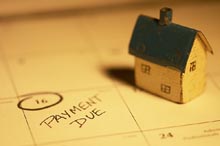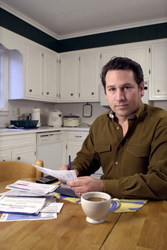What to Do if You’re Facing a Home Foreclosure (IMPORTANT to Share With Family and Loved Ones Who Need Help)
by www.SixWise.com
Twelve percent of homeowners with a mortgage were behind on their payments in the first quarter of 2009, reaching a new record, according to the Mortgage Bankers Association. Further, the rise is expected to continue until the end of 2010.
|

A record 12 percent of homeowners are behind on their mortgage payments.
|
While many of those in financial trouble have risky adjustable rate loans (nearly half of subprime ARM loans are now past due or in foreclosure, according to the Associated Press), the crisis has now expanded to include even borrowers with good credit.
In fact, nearly 6 percent of “prime borrowers” with fixed-rate mortgages are now past due or in foreclosure, which is nearly double the rate in 2008.
The top reasons why people lose their homes through foreclosure? Lower income and lost jobs.
However, although layoffs slowed to 345,000 in May, far fewer than were expected, the unemployment rate is still a sobering 9.4 percent, leaving many unemployed and struggling to make ends meet.
Are You at Risk of a Foreclosure?
If you haven’t yet missed a mortgage payment it may seem premature to worry about foreclosure, but it’s important to be aware of the signs that a problem may be brewing. According to the U.S. Department of Housing and Urban Development (HUD), you should ask yourself the following questions:
-
Has your financial situation changed due to a mortgage payment increase, loss of job, divorce, medical expenses, increase in taxes or other reasons?
-
Is your credit card debt becoming unmanageable?
-
Is it becoming difficult to pay all your monthly bills on time?
If the answer is yes to any of these questions, you should consider calling a HUD-approved housing counselor at (800) 569-4287.
A Foreclosure Timeline: What to Expect
A home foreclosure takes time, but often it catches families completely off-guard. Here’s a breakdown of what you can expect starting with your first missed payment:
-
One missed payment: You’ll be contacted by your lender either by letter or phone.
-
Two missed payments: Your lender will likely begin calling you to find out why payments have not been made. It’s best to take their calls and explain the problem rather than avoiding the situation, because you still may be able to make one payment and make up for two months of late payments.
-
Three missed payments: You’ll receive a “Demand Letter” or “Notice to Accelerate” from your lender stating how much you owe and will have 30 days to bring your mortgage current. At this point you can still try to work something out with your lender.
-
Four missed payments: If you have not paid the amount owed by the end of the 30 days, or worked out an arrangement with your lender, you will be referred to your lender’s attorneys and will be responsible for all attorney fees. At this point the attorney will schedule a sale of your home, and you have until the date of the sale to pay the amount you owe or make arrangements with your lender.
-
Redemption period: Many states offer a redemption period after your home has been sold at a foreclosure sale. During this period you can still reclaim your home by paying the outstanding mortgage balance and any other costs incurred.
If You Can’t Make a Payment, What Should You Do?
The first thing to remember is to stay in contact with your lender. You should contact your lender as soon as you realize you have a problem, as this will give you the best chances of being able to keep your home.
You should also open and respond to all mail from your lender, as the initial notices often contain valuable information about foreclosure prevention options that can help.
|

If you can’t make a mortgage payment contact your lender as soon as possible to work out a payment arrangement.
|
In terms of prioritizing your monthly expenses, your mortgage payment should be a priority after health care. If necessary, delay making payments on credit cards and other bills until you have paid your mortgage. You can also consider selling any assets you own, such as a second car, to help you make your payment until your income increases.
At any time during the process, you can also contact a HUD-approved housing counselor who can help you understand the law and your options, organize your finances and represent you in negotiations with your lender if you need this assistance.
Be wary of any foreclosure prevention companies that charge fees for their services, as you can get the service for free from HUD.
A Refinance Might Help
Given the severity of the housing market and unemployment rates, there are refinance programs in place to help struggling homeowners secure a mortgage payment they can afford. These include:
-
The Home Affordable Program: A new program just announced this March, it offers homeowners who owe more than their home is worth a lower market rate of interest that’s fixed for at least five years. To qualify, your home must not exceed the value of your mortgage by more than 5 percent, and you must have a loan backed by Fannie Mae or Freddie Mac. For more information, visit www.makinghomeaffordable.gov.
-
The Hope for Homeowners Program: If you’re in foreclosure or bankruptcy or at risk for default, this program helps you refinance into an FHA-insured loan that you can afford. For borrowers who refinance under Hope for Homeowners, lenders will be required to "write down" the size of the mortgage to a maximum of 90 percent of the home's new appraised value. In many instances, lenders will determine that such a reduction in principal will allow them to avoid a costly foreclosure, while helping borrowers stay in their homes. For more information, visit the Hope for Homeowners Web site.
The sooner you act on these refinance options the better, as they can take months to take effect. And again, if you are afraid you will soon have trouble making a mortgage payment, don’t delay. Contact a HUD-approved housing counselor who can provide you with the information and assistance you need to avoid foreclosure.
Recommended Reading
How to Get Health Insurance if You’re Unemployed
Are Americans “Financially Illiterate” and Causing Bankruptcies? New Research May Shed Light on Your Money Troubles
Sources
U.S. Department of Housing and Urban Development: Guide to Avoiding Foreclosure
WashingtonPost.com June 5, 2009
Yahoo News May 28, 2009